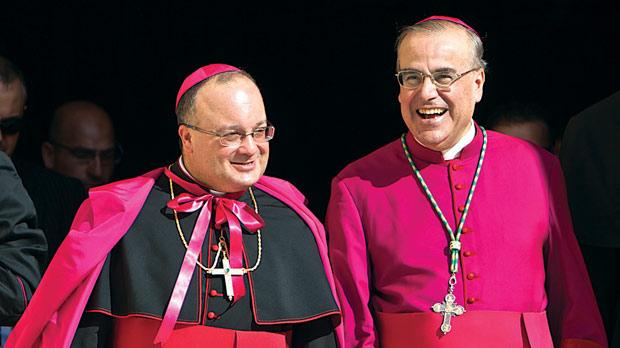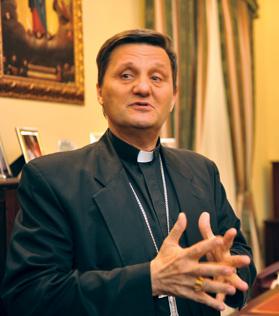Mgr Cremona to Officially Resign His Post Today, Mgr Scicluna to Become Administrator
Times of Malta
Archbishop Paul Cremona is expected to announce his resignation this morning, although it remains unclear whether this has already been accepted by the Pope. Mgr Cremona’s resignation is likely to be motivated by ill-health, which has prevented him carrying out his functions to the full over recent years. The Curia announced it will be holding a press conference this morning although it did not specify whether Mgr Cremona will be addressing it. According to Canon Law the office will only become vacant when the Pope accepts the resignation. In this eventuality, the reins of the Church in Malta will temporarily pass into the hands of Auxiliary Bishop Charles Scicluna until the Pope appoints another archbishop. Mgr Scicluna has no automatic right to succession.
He will have to call a meeting for the College of Consultors, a group of 10 priests who act as councillors to the Archbishop, for them to appoint a diocesan administrator. It is expected that Mgr Scicluna will be the diocesan administrator and according to Canon Law those “who temporarily care for the governance of the diocese are forbidden to do anything which can be prejudicial to the diocese or Episcopal rights”. If the Pope feels this is motivated because of rebellion in the Church, he may very well refuse the resignation A resignation is handled by the Vatican’s Congregation of Bishops headed by Canadian cardinal Marc Ouellet. The congregation prepares the file that is handed to the Pope for a decision. This newspaper is informed that Cardinal Ouellet and Pope Francis yesterday held a meeting as part of their regular schedule. It is not known whether Mgr Cremona’s resignation was on the agenda. Vatican spokesman Fr Federico Lombardi would not confirm whether the Holy See had received Mgr Cremona’s resignation. “I have nothing to add… if the Pope accepts a resignation or appoints a new archbishop it will be communicated through the daily bulletin,” he said. Apostolic Nuncio Aldo Cavalli was unavailable for comment. Mgr Cremona’s decision reported in yesterday’s edition of Times of Malta, caught many by surprise, including priests close to the 68-year-old Archbishop. A Curia official, who spoke on condition of anonymity, said he only got to know of the news when he read it in the paper. “Although some may have been expecting Mgr Cremona to go down this road at some point, his resignation now came as a big surprise,” another priest said. But for Frank Zammit, an expert on Vatican affairs, speaking of Mgr Cremona’s departure as yet may be premature. “The Pope may decide not to accept the resignation and Mgr Cremona will have to stay until he reaches 75, the age of retirement.” Mr Zammit said if the reason for resignation was illness, the Pope was very likely to accept Mgr Cremona’s request. “But if the Pope feels this is motivated because of rebellion in the Church, he may very well refuse the resignation, giving Mgr Cremona greater strength to confront his critics,” he noted. Canon Law urges bishops to resign if they “become less able to fulfil” their office. Mgr Cremona has been fraught with health problems and exhaustion, which sometimes kept him out of the public eye. Two years ago, on Mgr Cremona’s request, the Vatican appointed Mgr Scicluna as Auxiliary Bishop to help him administer the diocese. Choosing a new archbishop It may be early to speculate on who will replace Archbishop Cremona but one thing is certain: the decision will be taken by the Vatican. A consultation exercise does take place but Canon Law makes it clear that the definitive judgement rests with the Apostolic See. But it will not be a blind choice. Canon Law lays down that at least every three years, the conference of bishops should come together and “in secret” draw up a list of priests, including monks, who are more suitable for the episcopate. They are to send the list to the Vatican but every bishop also has an individual right to put forward the names of clerics whom he considers worthy. Apart from these names, the Apostolic Nuncio will also make his own findings by consulting people within and outside the Church hierarchy. This process may take its time, which means that the Pope may accept Mgr Cremona’s resignation without making an immediate appointment. Although Auxiliary Bishop Charles Scicluna is considered by many as being the lead candidate to become archbishop – especially after his transfer from Rome to Malta two years ago – Vatican expert Frank Zammit cautions against rash conclusions. In the Church it is often the case that those deemed to be likely successors will be nudged out of the race, Mr Zammit argued. “Although the two obvious options are Mgr Scicluna and Gozo Bishop Mario Grech, there is nothing that says the Pope will not opt for somebody else, like had been the case with Mgr Cremona,” he said. Canon Law states that to be ordained a bishop, the individual would have to be at least 35 years old, ordained a priest for at least five years, of good reputation and must show “solid faith, good morals, piety, zeal for souls, wisdom, prudence and human virtues”.
|
.
Any original material on these pages is copyright © BishopAccountability.org 2004. Reproduce freely with attribution.

